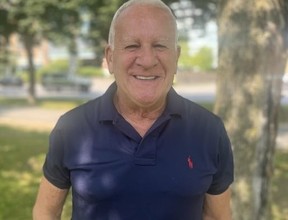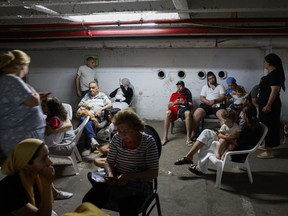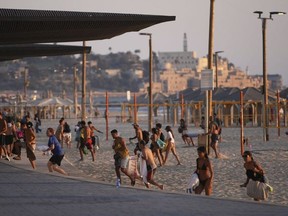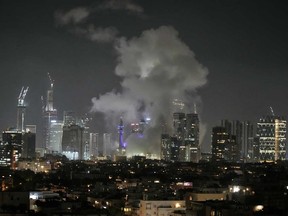The ‘unrelenting’ alarms prompt people to take shelter for hours at a time to survive the long days and nights

Article content
What’s it like living in Israel, right now?
Advertisement 2
Article content
When this writer was there last month, there were lots of sirens and alerts, but not much in the way of anxiety.
Article content
Article content
Even when a Houthi ballistic missile penetrated the Iron Dome and landed right beside Terminal Three at the country’s main airport – where my partner happened to be, along with dozens of Canadian kids – nobody seemed to lose their cool. They swept up the shrapnel and the dirt, and flights continued.
These days, it’s different. There’s lots of anxiety, now.
On June 13 – one day after the International Atomic Energy Agency (IAEA) censured Iran for continuing to enrich uranium that could be used in the dictatorship’s covert nuclear weapons program – Israel acted. It had no choice. It commenced bombing Iranian military and nuclear facilities.
Article content
Advertisement 3
Article content
Read More
-

KINSELLA: CUPE Ontario embraces madness with sponsorship of pro-Iranian protest
-

KINSELLA: First casualty of war is truth
-

KINSELLA: Israel’s move on Iran means the world is a safer place
Iran, meanwhile, responded by targeting Israeli civilians: hospitals, schools and apartment buildings, in Tel Aviv, Ramat Gan, Rishon Lezion, Bat Yam and Rehovot in central Israel, and Haifa and Tamra in the North. Everywhere, really. And Iran continues to target civilians.
So what is that like?
Mark Berlin is an Ottawa lawyer (and, full disclosure, a longtime friend). He was invited to Israel for a mission by its Foreign Ministry to meet with the country’s thriving LGBTQ community, and to celebrate Pride month.
“It was otherworldly,” said Berlin, who is now back home in Ottawa. “It was like something I’ve never experienced before.”
Advertisement 4
Article content

For Berlin, that’s no small thing. He worked in Ramallah in the West Bank for a decade, during the first and second Intifadas. He’s worked in war-torn Sudan. I know him to be brave and determined man.
After visiting the site of the Nova Music Festival and some of the kibbutzim attacked by Hamas on Oct. 7, 2023 – when thousands of Jews and non-Jews were murdered, wounded, raped and kidnapped by the terror group – Berlin and his delegation went to Tel Aviv to join in Pride celebrations. And that’s when Hell broke out.
“The sh– hit the fan, and we were in a war zone… When the alarms go off, you have one minute, 30 seconds to get to the shelter,” he explained. “And so you scramble to it. And the first day, we thought, okay, it’s gonna be once a night. Then it was twice a night.”
Advertisement 5
Article content
And then, he said, it started to happen multiple times, every night – and then during the day, too. It hasn’t stopped.
“It was unrelenting,” he said. “We were getting two, three hours of sleep at best, in 45-minute chunks.”

They’d sleep on the concrete floor in their hotel’s parking garage, which they were told was reinforced and was the best protection against Iran’s barrage.
“It was hot,” Berlin recalled of what it was like, sitting on the concrete, waiting for the all-clear. “I don’t want to say there was a stench of fear, but there was an odor of anxiety, if that makes any sense.”
He paused and laughed a bit. “I don’t think that describes it properly, but I would say there was anxiety.”
He and the others in his delegation became friends. Berlin and an Emmy Award-winning New York comedian Judy Gold became close. They’d sit on yoga mats they brought into the bomb shelter, and talk about everything and nothing. Then they’d get the signal to go back to their rooms.
Advertisement 6
Article content
“And sure enough, an hour-and-a-half later, we’d be back (in the shelter),” Berlin said.

One time, an explosion was heard.
“There was a massive boom, and all of a sudden there was a cloud of silt and dirt and dust that came up the garage ramps,” Berlin said. “I had a friend who actually had her mouth open, and she got a mouth full of grit. Okay, holy sh–.”
When the group got outside, they saw a building a block away had been hit, and there were ambulances and rescue crews everywhere.
How did they eventually get out? They left Tel Aviv, Berlin said, and went through what he described only as “a friendly Middle Eastern country.” From there, to Dubai, then to Montreal, then to his home and husband in Ottawa.

Berlin concluded by saying there is something he wants to be known: “I felt quite abandoned by the Canadian government. I can tell you we weren’t impressed. It wasn’t impressive.”
He pauses and sighs, then adds: “But we’re here and and we’re safe.”
And that’s what matters.
But for the ten million people who live in Israel? For them? For them, there’s nowhere else to go.
And Iran’s missiles continue to rain down on their heads.
Article content



